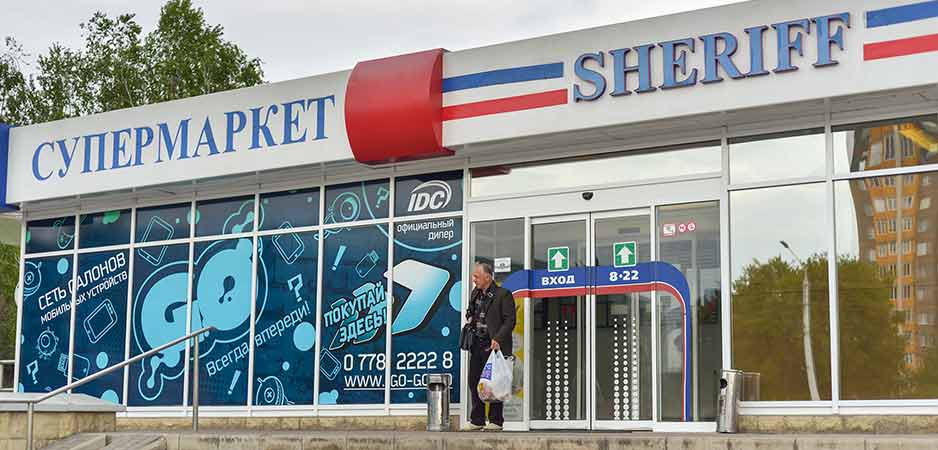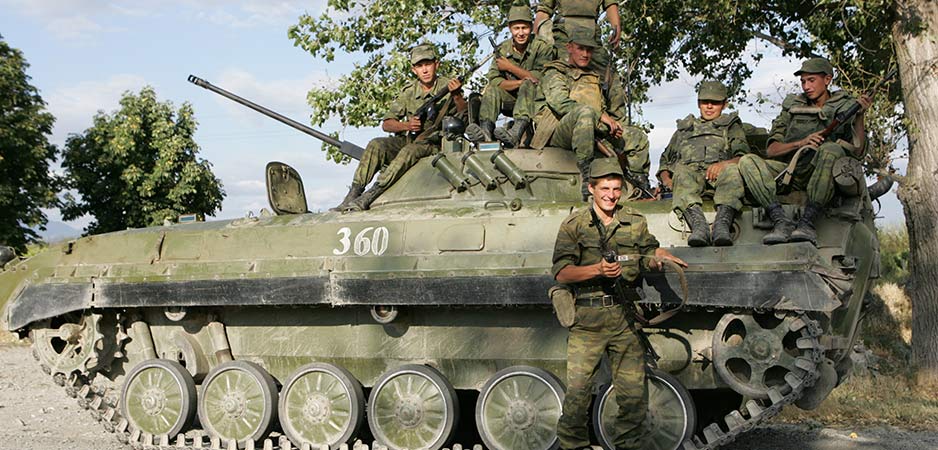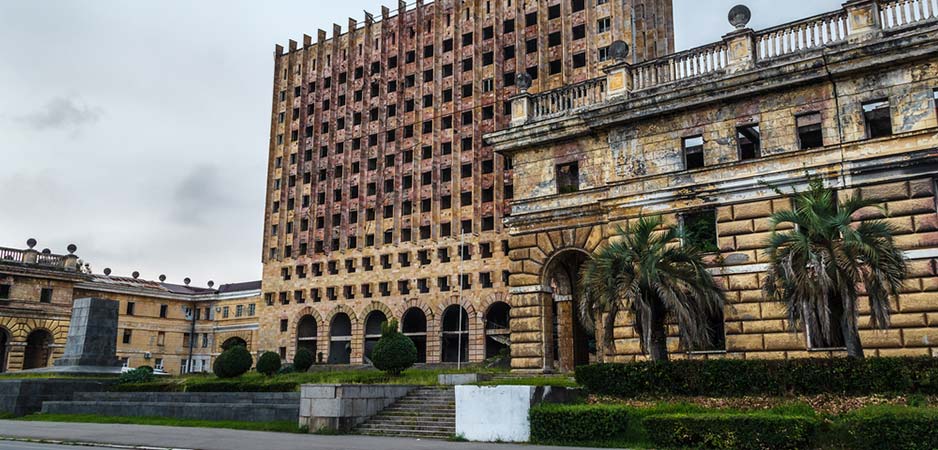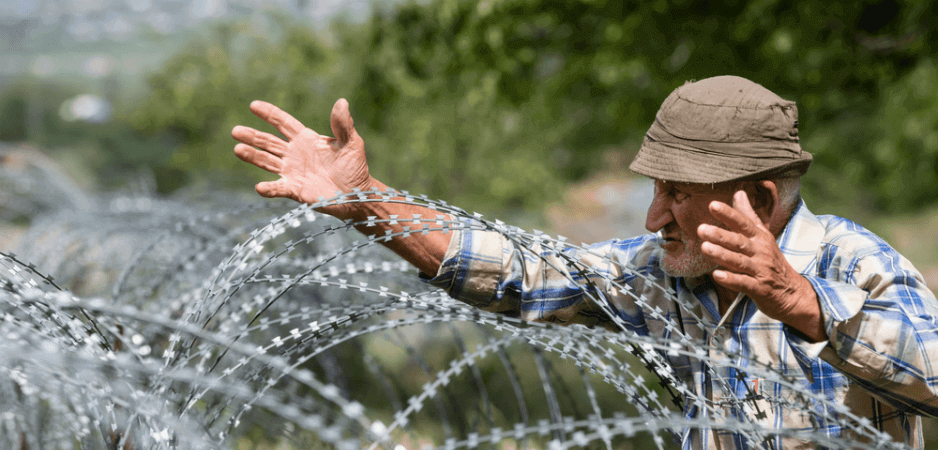Transnational exchanges and movements distinctive of the modern international community slowly came to a halt due to the unprecedented rate of transmission of COVID-19. Many sovereign states closed their borders to all sorts of non-essential travel. These unprecedented actions revived questions over the viability of open border policies, especially in the context that the tightening of travel restrictions was part of the broader solution to stop the spread of the coronavirus.
But what is the situation in places that aren’t tourism hotspots and remain fairly isolated from larger global markets, where resources are typically limited? Post-Soviet de facto states currently under the Russian umbrella, like Abkhazia, South Ossetia and Transnistria, may not have de jure independence, but they remain members of the wider international community affected by the global pandemic.
Abkhazia
While the rest of the world imposed social distancing and self-isolation, Abkhazians continued to gather in large crowds and greet each other in a physically close manner. The laissez-faire attitude was most likely due to the belief that Georgia’s breakaway region would be unaffected by the challenges of the wider world.
Sukhumi closed its border with Georgia to everyone save those seeking medical aid on March 11. At the same time, authorities began to take stock of essential medicine and made arrangements for testing procedures. Still, the latest round of presidential elections took place on March 22. The decision to go ahead with the vote may be thought irresponsible under the circumstances, but Abkhazia wanted to close this chapter of a lengthy political drama rooted in the disputed September 2019 presidential election and the resignation of former President Raul Khajimba.
Shortly after, on March 24, acting president Valery Bganba held a meeting with officials charged with the management of a coordinated response to COVID-19. In a first round of proactive measures, corporate events and mass weddings were banned between March 25 April 7. Tourists were barred entry just as duty-free shops located on the Russian border were ordered to shut. Certain non-essential businesses, such as beauty parlors and gyms, were closed.
Bganba announced a state of emergency on March 27 that currently extends until April 20. Like in many countries around the world, restaurants were open for takeaway only, dental care was suspended unless in emergencies, public transport was stopped and school holidays were extended for all levels. Citizens who returned from virus-affected countries were ordered to self-isolate for 14 days and avoid contact with others. Trade organizations had the responsibility to prohibit any price-gouging of essential goods, such as children’s products, medical products, disinfectant, personal protective equipment (PPE) and food.
The authorities in Sukhumi also offered financial measures similar to those implemented in more organized economies. Once again, this is demonstrative that though these de facto states may not have legal status, they function according to guidelines widely regarded as essential to the functioning of sovereign states. On April 1, Bganba signed a decree that canceled import duties on essential goods and medicines. The National Bank of Abkhazia announced that credit institutions should restructure debt held by citizens as well as defer payments owed to the Sberbank of Abkhazia. Following this, on April 2, Bganba offered some relief to small business owners and entrepreneurs. Those affected by the payment of patent taxes would be exempt for two months, customs duties were provided a month-long grace period, and the submission of appropriate accounting records was postponed.
Abkhazia has also received international aid to bolster its fragile health services. Sukhumi got “more than 500 personal care kits, more than 600 liters of antiseptic, and about 500 liters of antibacterial soap” from the World Health Organization (WHO). Russia provided some medical aid as well, such as a thermal imaging machine to screen temperatures at the Abkhaz-Russian border along the Psou river. Further shipments of PPE and therapeutic medication are expected. At the same time, the Abkhazian firm Moda-Tex began domestic production of surgical masks with cotton fabric provided by Russia.
As it currently stands, Abkhazia had a close brush with one COVID-19 case. A woman who journeyed from Moscow fell ill in the Galsky district and attended a village hospital. She was later transported to a facility in Georgia and tested positive for the coronavirus. Subsequently, Abkhaz authorities traced her travels from the checkpoint on the Psou and sent all 12 individuals she encountered into self-quarantine.
Hospitals across Abkhazia undoubtedly lack the resources to fight a pandemic. Luckily, so far, there have been no more reported cases, although a small number of people seek help from the infectious diseases hospital in Sukhumi every day. Abkhazia is trying to prepare for a possible outbreak with all the means it has available, such as the assignment of Gudauta central district hospital to treat infected patients in case of an overflow.
South Ossetia
In South Ossetia, it is feared that citizens do not have access to high-quality medical facilities and adequate beds if COVID-19 were to reach the level of community transmission. For instance, medical masks have been extremely difficult to source in pharmacies in Tskhinvali. This is further compounded by an early misunderstanding of the severity of the virus as the head of the State Committee for Information and the Press, Maria Kotaeva, surmised that COVID-19 was “an intensified form of the flu, which is mainly dangerous for the elderly.” Facts on the ground disprove this logic. However, leaders of major powers have expressed similar opinions.
President Anatoly Bibilov ordered the closure of the border with Georgia on February 27 — the day after Tbilisi announced its first case. Travel between Russia and South Ossetia has been stopped as well, but this will leave imports of essential goods unaffected. This is important, as Russia continues to experience a steady rate of infection and hospitalizations.
Many of the protocols “On measures to prevent the importation and spread of coronavirus infection COVID-19” are consistent with those applied in most states around the world. Non-essential businesses (beauty salons, spas, saunas, etc.) have been closed, and restaurants are allowed to only provide takeaway services. Cultural and sporting events have been banned. Schools are shut until the risk of any viral transmission subsides.
Bibilov assigned the South Ossetian pension fund, the postal service and financial institutions with the task of the delivery of pensions without interruption of service. Secondly, he promoted the exemption of rent payments for those with contracted incomes due to the lockdown. Bibilov also demanded that law enforcement clamp down on any businesses or individuals price-gouging essential goods, food and medicine. He stated that there would be “no concessions” in punishment for such cases.
These measures are designed to convey South Ossetia’s image of resolve in the face of crisis. On March 31, Bibilov toured the infectious diseases hospital in Tskhinvali to ensure that it was ready to receive patients when, or if, COVID-19 comes to South Ossetia. Media reports state that the hospital has 18 beds and an intensive care unit capable of providing ventilation for patients with respiratory failure. After contrary claims by Georgian sources that the de facto state has “one resuscitation table, one ventilator and no tests,” it is fair to note that at least the testing issue has been somewhat addressed. Tskhinvali sent two lab technicians to the Stavropolsky Antiplague Scientific Research Institute in Russia to learn how to conduct tests using the polymerase chain reaction method.
After his tour, Bibilov remarked that “You need to expect the best, and prepare for the worst.” While a semblance of preparedness could provide a sense of false security, the president’s statement is at least honest. Meanwhile, South Ossetians rushed out to shops to buy non-perishables such as porridge and juice, as well as toilet paper, in quantities similar to those in anticipation of major holidays. Once again, this is reflective of the general human condition across the world in time of crisis.
Bibilov summarized the responsibility of citizens in an address to the nation in one key statement: “Every time we leave the house without special need, or ignore the recommendations of doctors, we should think about our relatives, the elderly and children. Do not put them at additional risk.” South Ossetia has no confirmed cases of COVID-19, but it does have numerous patients under observation.
Transnistria
Transnistria — the Russian-speaking breakaway region of Moldova — is the hardest hit out of the three states discussed here. It has 58 confirmed cases of COVID-19 and three deaths as of April 8.
The authorities in Tiraspol acted quickly to secure its borders. On January 31, President Vadim Krasnoselsky issued a decree that banned the entrance of Chinese citizens as well as those from countries with high rates of infection. Further, anyone who visited such states was required to self-quarantine for 14 days and undergo medical examinations. Relevant ministries — Internal Affairs, State Security and the Customs Committee — were subsequently tasked with handling the sanitization of public spaces.
As COVID-19 began to spread through continental Europe, landlocked Transnistria implemented further preventative measures. The Operational Headquarters for the Prevention of the Spread of the Virus was established. On March 12, Krasnoselsky announced procedures that included a ban on mass gatherings and enhanced disinfection procedures for institutions and public transport. Those who returned from abroad had to fill out forms detailing their epidemiological map and self-isolate for two weeks. Krasnoselsky recognized from the outset that Transnistria lacked adequate supplies of surgical masks and commanded local sewing enterprises to produce them.
Days later, on March 17, authorities in Tiraspol declared a state of emergency. The measure was originally set to expire on April 5, but it has been extended to the beginning of May. Krasnoselsky warned that it could be prolonged further if necessary, and certain rights and freedoms could be limited.
As a consequence of the lockdown, the academic year from kindergarten to tertiary levels was suspended. The government originally planned to transition students to online learning platforms, but the political tensions with Moldova, as well as the countrywide quarantine, mean that necessary technological equipment remained delayed at the border. Closures of the Ukrainian and Moldovan borders meant that essential supplies — such as four trucks loaded with medicines — could not enter. Foreign citizens were denied entry into the region as well.
Stricter measures followed on April 1, primarily the decision to restrict the movement of all citizens of Transnistria. Residents must strictly comply with the broad self-isolation order and may leave their homes for necessary reasons only, such as the purchase of food, medical supplies, the provision of care for those that require assistance and essential work. All those who leave their homes must carry documentation and present it to the police when asked.
Authorities have kept their word that they would implement these austere actions through prosecution and inspections to ensure compliance. The state’s leadership wants to seem in control of the situation. Similar to other post-Soviet breakaway republics, Tiraspol has attempted to project calm despite legitimate concerns over the supply of food, medicine and relevant supply chains. Krasnoselsky released a statement insisting there is an adequate supply of food to endure a pandemic, calling on residents to respect the quarantine requirements. Food exports have been banned, and those most at risk will be provided with baskets of staples.
Addressing the situation in the health service, the president made a point of the inherent risks to those on the front line, just as doctors were raising the issue of having difficulties in procuring additional ventilators.
It must be acknowledged that the state leadership controls the media, meaning there is just one specific narrative. On the other hand, coverage out of Tiraspol and other cities has recognized areas of concern, such as the lack of ventilators and testing facilities capable of handling COVID-19 samples. For example, specimens are currently sent out to Chișinău, in Moldova proper, but the facility there is capable of processing only three dozen swabs from Transnistria per day. A working group has been established to determine whether laboratory specialists can handle this integral part of mitigation.
Further, Tiraspol has made an effort to provide citizens with reliable information about the virus. Materials and graphics explain basic symptoms and means of transmission. Instructional images on how to wear masks, wash hands and not touch the face based on WHO advice have been made accessible. Articles explaining the basics of sanitizing the home during a pandemic appeared. A campaign advising people to remain at home for the sake of their health and the well-being of others has been implemented, such as use of the hashtag #оставайтесьдома (stay home) and social media videos. Fining disobedient individuals acts as an additional layer of deterrence.
Krasnoselsky addressed his nation in a manner that is universally applicable: “Once again I appeal to you, dear citizens of Transnistria. Be aware! Follow quarantine requirements! I appeal to your consciousness, responsibility and discipline! Remember: the life of your loved ones, relatives, your life and health depends on you.”
People are often reminded that pandemics do not discriminate based on class, race or gender. The same argument can be extended to de jure and de facto states in that neither are immune to the spread of infectious diseases. However, the difference lies in that countries with acknowledged legal status and solid international relationships are — typically, though not always — better placed to source required resources to mitigate viral spread and treat patients.
De facto states are not as isolated as they are often portrayed, but they do not necessarily have networks available to secure what they need in a timely manner — and especially so when major states that support them are in turn faced with a similar public health crisis. Their concerns are deeply buried in news coverage of the tragedies and anguish of countries with established economies and advanced public health systems. Nonetheless, attention should be paid to how these tiny post-Soviet de facto states manage this fraught period domestically and at the level of local governance.
The views expressed in this article are the author’s own and do not necessarily reflect Fair Observer’s editorial policy.
For more than 10 years, Fair Observer has been free, fair and independent. No billionaire owns us, no advertisers control us. We are a reader-supported nonprofit. Unlike many other publications, we keep our content free for readers regardless of where they live or whether they can afford to pay. We have no paywalls and no ads.
In the post-truth era of fake news, echo chambers and filter bubbles, we publish a plurality of perspectives from around the world. Anyone can publish with us, but everyone goes through a rigorous editorial process. So, you get fact-checked, well-reasoned content instead of noise.
We publish 2,500+ voices from 90+ countries. We also conduct education and training programs
on subjects ranging from digital media and journalism to writing and critical thinking. This
doesn’t come cheap. Servers, editors, trainers and web developers cost
money.
Please consider supporting us on a regular basis as a recurring donor or a
sustaining member.
Support Fair Observer
We rely on your support for our independence, diversity and quality.
Will you support FO’s journalism?
We rely on your support for our independence, diversity and quality.






